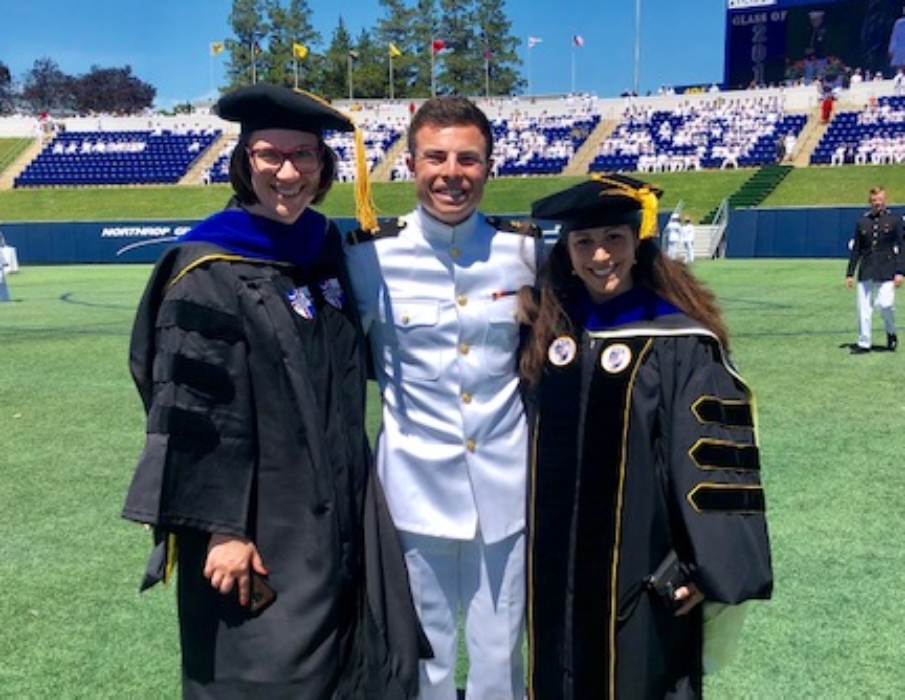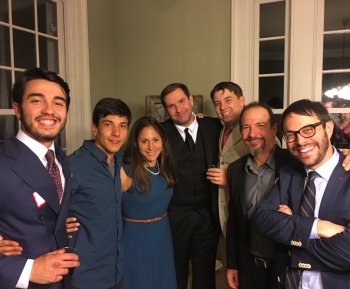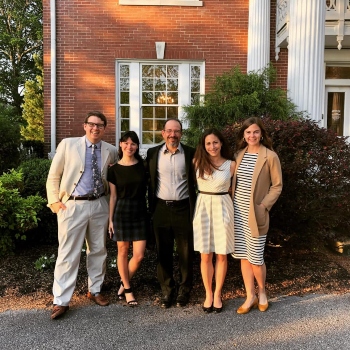EGO Alumni Interviews: Dr. Joan Romano Shifflett

by Sophy Schulman (M.A. student)
I spoke with Joan Romano Shifflett, who received her Ph.D. from Catholic University in 2013 and is currently the Writing Center Director and an Instructor at the United States Naval Academy. Her current book project—which will be published by LSU Press in Spring 2020—explores the artistic and personal connections among three writers who helped change American poetry: Robert Penn Warren, Robert Lowell, and Randall Jarrell. She also serves as President of the Robert Penn Warren Circle and co-editor of the peer-reviewed literary journal, Robert Penn Warren Studies.
Joan, can you tell us a bit about your current work as Director of the Writing Center at the Naval Academy, and the path that brought you there from CUA?
I completed my Ph.D. in May of 2013, but I never actually went on the job market for a tenure-track position. Because of the timing, I didn’t want to wait an entire year without a full-time job, so I just applied [to the position at the Naval Academy]. I had actually been offered a job from Catholic University to be the assistant director of the First-Year Experience program and to teach in the English department. But I saw a job posting for a full-time writing specialist at the Naval Academy, and I applied, got the job, and started in August. So it was a really quick turnaround for me!
A writing specialist—that’s a position distinct from leading a Writing Center, right?
That’s right. When I was hired, the [Naval Academy’s] Center for Academic Excellence was taking over the Writing Center from the English department, and so they hired me, as second-in-command to the Writing Center director, to usher in that move. So it was actually an awesome opportunity because I got to build the Writing Center program from scratch. The Writing Specialist position was billeted as someone who would offer one-on-one support to midshipmen in the Writing Center, and would take a leadership role there, and do some teaching as well. So, right from the get-go, I was put in charge of [organizing and training] the peer writing tutors. At the time there wasn’t even a system in place to have students peer-tutoring in the Writing Center at all—it had been just faculty members from the English department. It was fun to conquer that challenge of building something new—it still is both fun and challenging!
I’d imagine your work at CUA’s Writing Center was sort of a model for what you implemented at the Naval Academy—was that actually the case?
I’m laughing only because—you can ask [CUA alumni working there]—it’s probably very similar to CUA’s because I created it! We very much abide by the motto of “better writers, not just better products,” and it’s very much a collaborative approach, so in terms of its underlying or underpinning philosophy, it’s pretty much dead-on with CUA’s. Especially in using classical rhetoric and reader-versus-writer language and strategies; it’s all very similar.
What experiences at CUA, besides working in the Writing Center, most helped you prepare for working at the Naval Academy and how were they influential?
I would say that the wide variety of classes that I taught in the English department, my experience teaching international students and multilingual learners, and my position as assistant director of CUA’s Writing and Rhetoric Program were all things I got to do that were pretty desirable in the job market. In addition to teaching three or four iterations of ENG 101, I taught a ENG 326, which was a writing workshop for upperclassmen, I taught a course on Form and Value in Poetry, I was a TA for my rock star hero, Ernie Suarez’s class on Poetry and Rock, and his American Literature survey, so I did get a nice variety of teaching experience as well.
To sing Catholic University’s graduate program’s praises, I felt so prepared and so confident to take on this pretty big role at the Naval Academy. I was actually promoted and given the Writing Center Director position several years after I was hired, and that is one hundred percent due to the rigorous training that I received from the pedagogy class, and all of the other formative training I received at CUA. As the assistant director of the Writing and Rhetoric program [at CUA], I also had the chance to try my hand at leadership—I helped to shape the curriculum for our then-new Logic & Rhetoric class, building an enormous how-to model in addition to a model syllabus with model lesson plans. I also had the opportunity to perform observations of graduate teaching fellows, which has served me well in my leadership role now. I most certainly felt very prepared coming out of CUA to take on this job.
What has been your favorite part of leading the Writing Center at the Naval Academy?
I honestly love so many things about it. I have the opportunity to teach at Naval Academy as well, so I get the best of both worlds, if you ask me. I occasionally teach the freshman English class and also a specialty class for top-performing upperclassmen. You get a lot of freedom in creating your syllabus, and so in terms of teaching English 101 in the Fall semester, you just need to make sure you’re doing essays, short stories, and drama, and in the Spring you do poetry and novels. And other than that you get to pick the readings, whether you want to have a classical rhetoric bent, and you get to write your own assignments. The freedom of that is fantastic. I feel the same way about the Writing Center; it’s very fun because you don’t see the same prompts all the time; it’s a variety of writing prompts, everything from English to cyber and electrical engineering, we get lab reports, [and so on.] So there’s tons and tons of variety in the Writing Center.

Well, the overall concept remained the same, but the book is almost entirely a rewrite of the dissertation. For one thing, the structure is completely different: I chopped a bunch of material out of the dissertation, wrote four new chapters, and streamlined it into a chronological narrative. So even though the germ was there, the main idea, it’s really a completely new work. I also got to dig into some archives and do some research which enhanced parts of my argument in some places. The good thing about my job is I had the summers to work on the book as a ten-month employee. So, for the last three summers I was able to hammer out a lot of revision for the book.
So when you’ve completed your dissertation and you think it has the potential to be reworked into a book, how do you go about approaching a University press?
The way I did it was actually atypical. Basically, I knew that I wasn’t going to feel confident approaching presses until I had the whole thing completed—and so I took a real risk because I took time, and wasn’t publishing substantial articles—just reviews. I put all my eggs in one basket and spent all this time writing this book in its entirety, and only then did I feel confident in pulling together a book proposal. I knew LSU was my number-one choice for a press, just based on the books they had published that were really in line with the project I had completed, so I wrote to them and sent two sample chapters, and lo and behold, I heard back a week later that they wanted to see more. And I had a contract a few months after that! But again, my experience is definitely atypical. Most of my friends who also have books, might have had only one or two chapters written before they started to write to different presses. You definitely do not need to have the completed project in hand before you start shopping your proposal around.
I’d love to hear how you yourself would describe your forthcoming book project.
A more organic description than the formal write-up might be: you take Robert Penn Warren, a quintessential Southerner, often associated with the Fugitives, John Crowe Ransom, Allen Tate, and then Robert Lowell up in Boston, the poster boy for confessional poets, and then Jarrell who’s from California, and largely forgotten and ignored for his poetry because he’s thought of as primarily a literary critic. I show how the three of them mined very purposefully from their shared mentors, in order to change poetry to make it more accessible, to have more of a colloquy with their audience. They talked to each other about these particular changes, and made comments on each others’ work for how to achieve these ends. So they really worked together, collaborating in the creation of this new American poetry. I’m poking at less nuanced categories that have prevented a lot of us from understanding how contemporary American poetry came to be and what the roots of American verse actually are.
It must have been exciting to have pinpointed such a significant gap in the ordinary understanding of these poets!
Thank you, it was! At first I just fell in love with the poetry of Robert Lowell and Robert Penn Warren separately, and in reading more about them and realizing how close they were to one another, I followed that breadcrumb trail and discovered the larger literary significance of those connections.
And, I imagine, also discovered what it is they had in common that made their poetry appeal to you.
Absolutely. It really happened in an organic way. The thirty-second version of my approach was: I made an enormous timeline and a chronology for each author, and I was able, as I was going through hundreds poems and primary and secondary sources, to take notes and notice patterns, and from those notes emerged this big outline, and then from the outline, when it came time the write, I sat there with my big packet and my big outline and ordered notes, and was just able to sit down and write. So it was very methodical, which is the only way that made this seem manageable...because dissertations can be scary and seriously daunting!

Create your own definition of success. Don’t be limited by the idea that a tenure-track line is the only way that you can be rewarded and find fulfillment. Think really deeply about what you want your everyday to be. And feel good a chasing those jobs, marketing your strengths, and don’t believe anyone that you’re a failure if you don’t get a tenure-track job. There’s so much that we’re well-suited for and prepared to do after finishing the program at CUA. There are not a lot of effective communicators out there who can think and write and speak well, so we’re highly desirable if you’re willing to shift your idea of what success looks like, coming into the job market with an English Ph.D.
One more thing—circling back to the beginning of your career, what first drew you to CUA’s English program?
I can tell you a hundred percent that it was Ernie Suarez’s approach to literature, the fact that it’s “literature first,” and the process of truly mining the text, more than anything else, for discovery, and the beautiful importance of what the words are actually saying—how the author’s stylistic choices are enhancing that meaning. I think that my story kind of mirrors this with how my book came about; I was reading the texts closely and paying attention and understanding and considering the poems, without getting so caught up in the theory elements—not that that’s not important, but I just loved the approach that it’s literature first, and everything else is secondary.
An excerpt from the write-up for Warren, Jarrell, and Lowell: Collaboration in the Reshaping of American Poetry provided by Louisiana State University Press:
“Joan Romano Shifflett’s Warren, Jarrell, and Lowell: Collaboration in the Reshaping of American Poetry traces the artistic and personal connections between the three writers. Her study uncovers the significance of their parallel literary development and reevaluates dominant views of how American poetry evolved during the mid-twentieth century.
…
During the 1950s, the three poets became public figures, producing major works that addressed the nation’s postwar need to reconnect with humanity. Warren, Jarrell, and Lowell continued to respond in interlocking ways throughout the 1960s, with each writer using innovative stylistic techniques to create a colloquy with readers that directed attention away from superficial matters and toward the important work of self-reflection.
Drawing from biographical materials and correspondence, along with detailed readings of many poems, Warren, Jarrell, and Lowell offers a compelling new perspective on the shaping of twentieth-century American poetry.”
Photo credits: Joan Romano Shifflett
